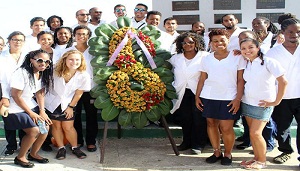 Repression is how Manolo de los Santos, representing the U.S.-based Inter-Religious Foundation for Community Organizing (IFCO), described recent threats by the Internal Revenue System (IRS) to revoke the group’s tax-exempt status as a humanitarian organization.
Repression is how Manolo de los Santos, representing the U.S.-based Inter-Religious Foundation for Community Organizing (IFCO), described recent threats by the Internal Revenue System (IRS) to revoke the group’s tax-exempt status as a humanitarian organization.
“We are being accused of violating certain laws, principally the Trading with the Enemy Act. We defend our vocation and conviction that bringing humanitarian aid to Cuba is within our rights as U.S. citizens, as persons of faith and conscience,” said the young Dominican raised in the States, during a Havana press conference, referring to the donations made by IFCO/Pastors for Peace to the island’s people since 1992.
At the headquarters of the Cuban Institute of Friendship with the Peoples (ICAP), De los Santos commented that the situation shows how contradictory current U.S. policy toward Cuba is, with repeated statements being made around the world about the normalization of relations, while at the same time persons and organizations which have built bridges between the two peoples are harassed.
He emphasized the impossibility of stopping Pastors for Peace from showing solidarity or making trips to the island, a civil right of all citizens, and mentioned the donations made by persons of goodwill – including medicine, educational materials, and vehicles for churches, schools, and hospitals – which have also served as a symbolic challenge to the criminal economic, commercial, and financial blockade imposed by Washington for more than half a century.
He explained that the current issue with the IRS began when the organization provided medical support to the Palestinian people in 2009, when they were cruelly subjected to a siege by Israel. At that time, the IRS launched an investigation of the group, threatening to eliminate its tax-exempt status for not requesting permission from the Treasury Department to send humanitarian aid to Cuba. If the threat is carried out, IFCO will be required to pay taxes on every dollar donated to the organization.
IFCO/Pastors for Peace has been attacked since its foundation in 1967, as a non-profit, non-governmental organization committed to showing solidarity not only toward Cuba, but toward other countries struggling for their freedom in Central America, Africa, and Asia, as well as communities within the United States.
“This type of attack hurts us,” De los Santos said, referring to the long battle unfolding within the U.S. judicial system to stop the implementation of the arbitrary measure. He insisted that the organization is willing to go as far as the Supreme Court to seek justice, emphasizing, “We have never been alone, or silenced, we have the support of organizations in Cuba and on several continents; we receive messages from countries around the world.”
Reverend Joel Ortega Dopico, president of the Cuban Council of Churches (CIC), described the threats as unjust and irrational, since diplomatic relations between the two countries were established in 2015, and talks are now underway to move toward normalization, which will require that the U.S. abstain from financing subversion in Cuba, and return territory illegally occupied by the Guantánamo Naval Base, where torture in routinely carried out in the prison there.
Reverend Ortega noted that the punitive IRS measure is not directed toward one institution, but rather all persons who have shown how positive relations between peoples can de developed.
Nacyra Gámez, representing the Pastors for Peace Distribution Committee, noted that an exhaustive study of the conflict was needed to challenge the sanctions under consideration, since they would have an impact on many families benefiting from social projects in Cuba.
Yanisca Lugo presented a statement from the Martin Luther King Center in Havana, calling on all religious institutions to denounce the IRS action. “Neither love nor faith can ever pay taxes,” the document states, making an appeal for joint action against the injustice perpetuated by U.S. imperialism against peoples immersed in struggles for their national sovereignty.
In another communiqué, ICAP denounced the attack as representing a threat to friendship between peoples, and called on friends around the world to join in showing solidarity with this sister organization.
The text reads, “We energetically reject this situation which our IFCO brothers and sisters are facing, when they have brought the country donations, medicine, and with the people have defended peace and solidarity as necessary in this world marked by war and social injustices.”
Also speaking out against IRS harassment of IFCO were Juan Manuel Ramos Gómez and Sol Henrik Bockelie, students at the Latin American School of Medicine in Havana, who participated in a tribute at the Anti-Imperialist Tribunal to the organization’s founder, Lucius Walker, who died September 7, 2010.
The two are among the many low-income students from the United States who have been awarded full scholarships to study medicine in Cuba. Speaking with Granma International, they condemned the attack by U.S. authorities, and expressed their hopes for an agreement to avoid damage to solidarity efforts with needy peoples, be they victims of war or natural disasters.
(Granma)